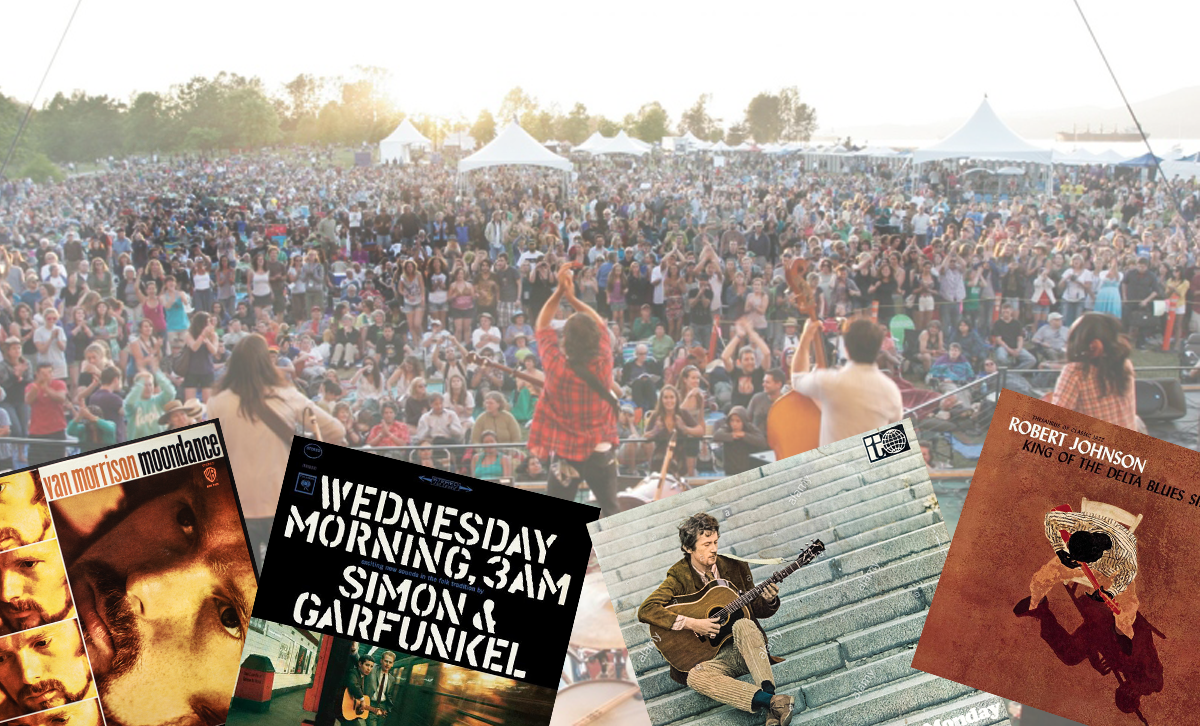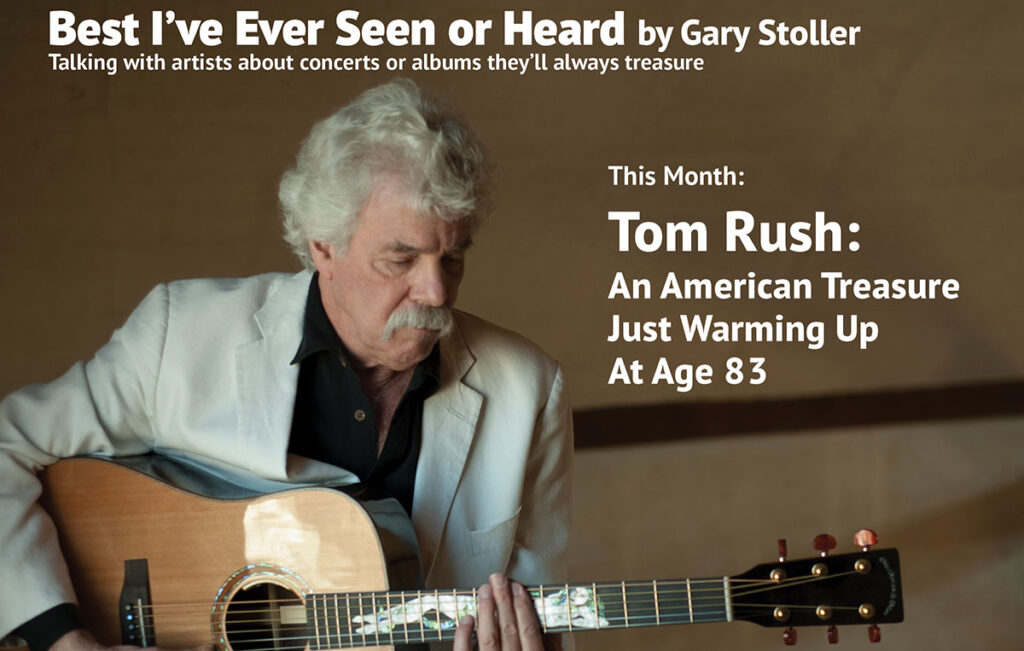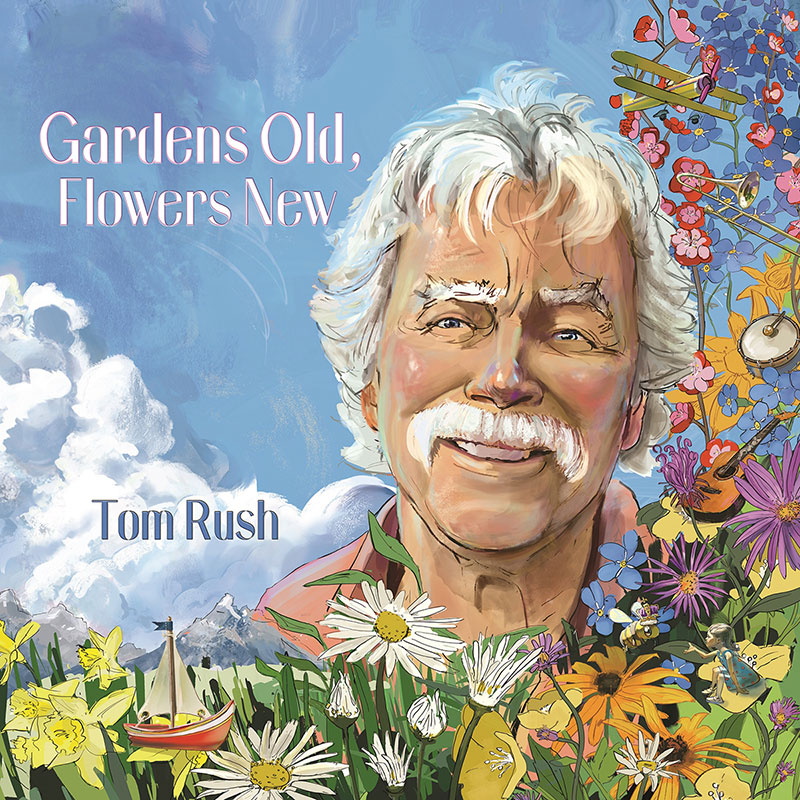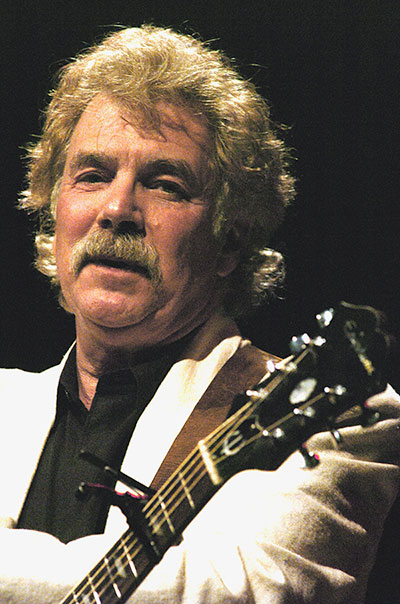

Tom Rush is an American treasure. His self-released 1962 album Tom Rush at the Unicorn 1962 was a start, and now, 62 years later, at age 83, he may have released his finest album.
Rush wrote 13 of 14 songs on the new album, Gardens Old, Flowers New, and new lyrics for a traditional blues song “Gimme Some of It.” The songs are lively, diverse and enhanced by the tasteful playing of nine backing musicians on numerous instruments, including keyboards. trombone, saxophone, dobro, cello, accordion and hurdy-gurdy. And the crowning layer is Rush’s voice, sounding as warm, reassuring and spry as it did many decades ago.
“So glad you love it, Gary,” the veteran singer-songwriter, guitarist and folksinger says. “I concur that it’s my best — so far!”
Reviewers have hailed Rush’s 1968 record The Circle Game, which covered songs by Joni Mitchell, James Taylor and Jackson Browne before they reached stardom, as the best in a 16-album career. The record included Taylor’s “Something in the Way She Moves,” Browne’s “Shadow Dream Song” and three Mitchell songs — “The Circle Game,” “Urge for Going” and “Tin Angel.” Rush’s own song on the album, “No Regrets,” stands as one of the greatest in folk music.
Before Gardens Old, Flowers New was released, though, Rush regarded his previous album, 2018’s Voices, as his best work.
The albums are “the only two where I wrote all the songs, except for a couple of traditional tunes,” he says. “I think some of my earlier work was overproduced and too busy, but Matt Nakoa, the producer for Gardens Old, Flowers New, stayed well away from that territory!”
What’s the message in the title Gardens Old, Flowers New?

“It’s a line that appears in two of the songs,” Rush says, “and is meant to convey the idea that some things in life — falling in love or watching your child learn about the world — have happened many, many times over the centuries. But each time is new and different.”
The line became the album title, “because Matt, while not coming out and telling me I’m old, said that, although I’m no spring chicken, I’m coming up with new songs that he genuinely seems to love. So, I’m the old garden; the flowers are the new songs.”
Several songs, including the opening cut “Sailing,” “Toy Boat Song” and “The Harbor,” have a nautical theme, a recurring topic in Rush’s catalog. I ask him why he seems to have such a fascination with all-things-maritime.
“I’ve noticed that, too,” he responds, “but I honestly have no idea why I keep coming back to the water! But I think some of my best work — “The River Song,” “The Dreamer,” “Cold River” and more — have a water theme.”
The new album’s sixth song, “Lullaby in E,” is a wistful, beautiful instrumental.
“I thought it made a perfect companion to ‘If You Will Love Me’ (the 5th song) — same key, same tempo, same mood,” Rush says.
Rush, whose engaging live shows are his hallmark, cites other instrumentals he has recorded: “Rockport Sunday” on The Circle Game album and Geoff Muldaur’s “Mole’s Moan” on his 1963 album Got a Mind to Ramble. “Rockport Sunday” is the theme music for Rush’s online subscription series Rockport Sundays where he and a guest chat and share songs for about 15 minutes every Sunday.
All songs on the new album were recorded March 29-April 3, 2023, and most were written in the past few years.
“A few were written long ago and have never seen the light of day until now,” Rush says. “‘Glory Road’ is 50 years old! ‘Siena’s Song’ was written when my daughter was a baby, some 24 years ago. ‘To See My Baby Smile’ was started 30-ish years ago and just finished recently.”

I ask how, at age 83, he has been able to keep his warm voice intact and how he compares his voice today with his voice in the 1960s.
“I’ve been lucky voice-wise,” he answers. “I used to say it was because I never touched liquor or kissed girls, but nobody was buying it. I was told, when I was starting out, that I sounded much older than my years — now it’s the opposite. The high notes have admittedly gotten higher — something to do, I suspect, with the expansion of the universe — and I’ve had to pitch a couple of songs down a key. But the low notes are better than ever!”
As one gets older and more experienced, do albums get easier or more difficult to record, and are there plans for more albums in the future?
“Gardens Old, Flowers New was easy — largely because it was so much fun working with such a talented crew of players,” Rush says. “Matt bore the brunt of all the logistics and decision-making about who was going to play what and when.”
There are no immediate plans to return to the studio, “but I have a notion that it might be time to do another live recording of silly songs and stories,” he says. “I did one some years ago called Trolling for Owls that was very popular, but it’s sold out now, and maybe a new one would be a good idea. I also might like to do a collection of songs I didn’t write, to be called Songs I Wish I’d Written. My kids are suggesting it be called Songs by Dead People!”
Seven years ago, Rush told me that the songwriters he holds in highest regard are Paul Simon, Joni Mitchell, Jackson Browne and James Taylor. I ask him for his favorite songs of these songwriting greats.
He first mentions Simon’s “The Boxer,” because “it’s just a great, great song and because of a bit of history,” Rush says. “You know that sound that comes after ‘li, la, LI’ in the chorus? Well, I was recording in Studio B at Columbia Studios, and one of the engineers pointed out that there was a closed-off stairwell at the back of the room. Apparently, while Simon was working on that song, someone slammed a door at the bottom of the stairs, and the echoing BOOM was so compelling that Paul and Roy Halee, his producer, decided to record it and splice it into the track.”
“Urge for Going” was “one of the very first songs I heard Joni sing, when she came into the Chessmate in Detroit where I was playing,” recalls Rush, whose song “I Quit” on the new album includes a tribute to Joni in the last verse. “She did a short audition set for me, hoping I might record some of her songs. It blew me away, and Elektra released a single of it sometime before The Circle Game album came out.
“That album was the first time, I’m told, that any of Joni’s, Jackson’s or James’ songs had been recorded. Rolling Stone magazine accused me of ‘ushering in’ the singer/songwriter era!”
Rush playfully expresses his fondness for Browne’s classic song “These Days.”
“He actually joined me on stage at a show in Santa Monica a few months ago,” Rush says, “and I got to show him how the song really ought to be played!”
Rush’s favorite Taylor song is “Riding on a Railroad,” which Taylor recorded on his classic 1971 album Mud Slide Slim and the Blue Horizon.
“I remember he sent me a tape of the song, not on a proper reel, but wrapped around a stick!” Rush recalls. Having gone through the effort of unwrapping it and winding it on a reel, I had to like it. Do you think he might have planned it that way?”
Rush says it’s “a very hard call” to identify the best album he ever listened to, but he names one that probably less than 1% of music fans have ever heard.
“The Swan Silvertones self-titled album really swept me away back in the day,” Rush says about the 1940s-1960s gospel group. “Claude Jeter’s high, high vocals were just so compelling!”
Rush wasn’t their only fan. A line from their song “Mary, Don’t You Weep” — “I’ll be a bridge over deep water if you trust in my name” — inspired Paul Simon to write “Bridge Over Troubled Water,” Rush says.
Performances at Boston’s Club 47 in the 1960s were a big influence on Rush, who grew up in New Hampshire and attended Harvard University.
“The cool thing about the Club 47 shows was that, when the legends were playing there, most were very approachable. You could go up to Sleepy John Estes, Earl Scruggs, Muddy Waters, Doc Watson — whomever — and ask, ‘How do you do that thing you do?’ and they’d show you. Amazing!”
Rush also points to a U2 show in Phoenix in 2005,
“That was pretty special, partly because Bono managed to slip in the chorus of my ‘No Regrets’ and then credited me,” Rush says. “Of course, he pronounced me ‘Tomb Roosh,’ so nobody knew what the hell he was talking about.”
With 16 albums, excluding compilations, in his catalog and seven decades of live performances, I ask: How does Tom Rush sum up his career and his contribution to popular music?
“Well, as I approach the halfway point in my career,” he quips, “I think it’s a bit too soon to be summarizing! I guess a recurring theme is that I love to help the really talented newcomers connect with my audience.
“A recent revelation is that the audience doesn’t want perfection — they want connection,” Rush adds. “This is good news for me, since perfection has never been even remotely in reach, but I think I’ve gotten better at the connection part over the years. Just as I’m being told that Gardens Old, Flowers New is my ‘best ever’ — if I may quote you — I’m also hearing that my shows are getting better and better. Can’t wait to see what comes next!”
